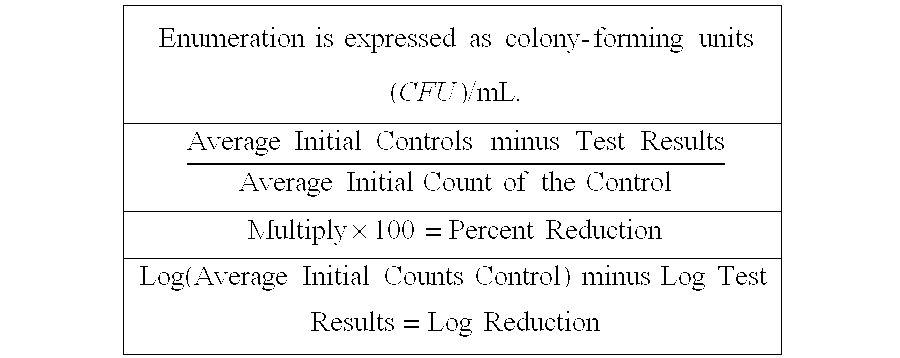Nasal, wound and skin formulations and methods for control of antibiotic-resistant staphylococci and other gram-positive bacteria
a technology of antibiotic-resistant staphylococci and other gram-positive bacteria, applied in the direction of antibacterial agents, drug compositions, prostheses, etc., can solve the problems of limiting or even eliminating the therapeutic options, skin lesions can easily progress to life-threatening blood or bone infections, and long been recognized as particularly problemati
- Summary
- Abstract
- Description
- Claims
- Application Information
AI Technical Summary
Benefits of technology
Problems solved by technology
Method used
Image
Examples
example formula i
[0027]
IngredientAmount / 100 gramsFunctionPetrolatum55.0gramsCarrier base andemollientPropylene glycol10.0gramsCarrier base andemollientPolawax15.0gramsEmulsifierDodecanol5.0ccAntimicrobial andpenetrating agentGlycerol5.0 gramsAntimicrobial andmonolaurateemollientBenzoic acid2.0gramsAntimicrobialEucalyptus oil2.0ccOdorantWater, DI6.0gramsDiluent
[0028]To prepare the novel ointment of this invention, petrolatum and Polawax are heated slowly to melt the products. Proylene glycol is added to the liquified petrolatum and Polawax with stirring to produce a homogenous mixture. The medium-chain alcohol(s), fatty acid ester(s), benzoic acid, eucalyptus oil and water are added and stirred to produce a homogenous mixture. While slowly stirring, the solution is allowed to return to room temperature.
[0029]An alternative representative formulation is exemplified below.
example formula ii
[0030]
IngredientAmount / 100 gramsFunctionPEG 40080gramsCarrier base andemollientPEG 335012.5gramsCarrier base andemollientDodecanol4.0gramsAntimicrobial andpenetrating agentGlycerol3.0gramsAntimicrobial andmonolaurateemollientBenzoic acid0.50gramsAntimicrobial
[0031]To prepare the alternative formulation of the novel ointment of this invention, PEG 3350 is heated slowly to melt the product. The PEG 400 is added to the PEG 3350 and stirred to produce a homogenous solution. The medium-chain alcohol(s), fatty acid ester(s) and benzoic acid are added and stirred to produce a homogenous solution. While slowly stirring, the solution is allowed to return to room temperature.
[0032]The aliphatic alcohol of the formulation is selected so that it can be employed at a concentration and pH compatible with contact with the mucous membranes or open wounds. The appropriate pH of the product will depend upon the application site. The pH may be lowered to 4.0 for products applied to the squamous epithe...
example formulation iii
[0050]
IngredientAmount / 100 gramsFunctionEthyl alcohol68.42ccAntimicrobialEmery 3154.00ccSurfactant / conditionerAlmond Oil4.00ccEmollientMedium chain3.00ccEmollienttriglyceridesDodecanol2.50ccAntibacterial / penetrating agentGlycerol monolaurate2.50gramsAntimicrobial / emollientEucalyptus globules2.00ccOdorantBenzoic acid2.00gramsAntimicrobialGlycerin2.00ccHumectant / protectantLactic acid2.00ccHumectant / conditionerVitamin E2.00 ccAntioxidantSpearmint1.00ccOdorantKlucel1.00cc Emulsion stabilizerThymol0.50gramsOdorantDI Water3.08ccDiluent(Q.S. to 100 cc)
[0051]One advantage of the formulation is that it is not subject to the restrictions of antibiotic use previously discussed. The formulations disclosed do not present a high risk of creating strains with antimicrobial resistance, unlike antibiotics, said antibiotics being naturally or synthetically derived from microbial sources. One of the characteristics of the formulation is that it comprises multiple antimicrobial components thus reducing...
PUM
| Property | Measurement | Unit |
|---|---|---|
| concentration | aaaaa | aaaaa |
| concentration | aaaaa | aaaaa |
| concentration | aaaaa | aaaaa |
Abstract
Description
Claims
Application Information
 Login to View More
Login to View More - R&D
- Intellectual Property
- Life Sciences
- Materials
- Tech Scout
- Unparalleled Data Quality
- Higher Quality Content
- 60% Fewer Hallucinations
Browse by: Latest US Patents, China's latest patents, Technical Efficacy Thesaurus, Application Domain, Technology Topic, Popular Technical Reports.
© 2025 PatSnap. All rights reserved.Legal|Privacy policy|Modern Slavery Act Transparency Statement|Sitemap|About US| Contact US: help@patsnap.com

